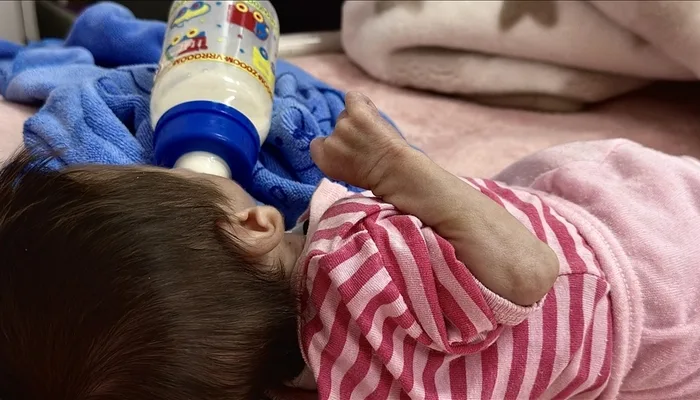Israel has announced it will permit a “basic amount of food” into Gaza after a 10-week blockade. The move aims to prevent a full-scale famine, according to a statement from Prime Minister Benjamin Netanyahu’s office on Sunday.
The statement added that the Israel Defense Forces (IDF) recommended the decision. It said the limited food access would allow military operations to intensify while preventing a humanitarian catastrophe.
However, the ongoing catastrophe in Gaza has captured global attention. Media outlets, including the BBC, report daily on the events. Yet, beneath the surface of the news, a troubling pattern emerges. The BBC’s framing often paints a picture that favors Israel’s narrative while downplaying Palestinian suffering. Let’s breaks down key points from a recent BBC report to expose the gap between framing and reality.
Find the news here.
1. “Israel will allow a basic amount of food”
This phrase sounds like a generous gesture. It suggests that Israel is kindly opening a small window to humanitarian aid. The BBC’s wording implies a step towards resolving the crisis. But this framing hides the harsh truth.
Reality: For over 10 weeks, Israel imposed a total blockade on Gaza. This blockade caused starvation and famine. Families went without essential food. Children faced severe malnutrition.
The announcement to allow “basic food” came only after this long period of deprivation. So, it is not a humanitarian gift. It is a reluctant response to international pressure and mounting suffering.
Hypocrisy: Presenting limited aid as generosity is misleading. It obscures the fact that Israel created the crisis by blocking supplies in the first place. This selective framing helps shape public opinion to see Israel as humane, rather than responsible for the starvation.
Propaganda framing: “We starved them for 10 weeks, now we’re feeding them a bit to look humane.” This is not aid; it is a public relations move.
2. “To ensure a famine crisis does not develop”
This line gives the impression the famine is still in the future. It downplays the existing suffering in Gaza.
Reality: Mass starvation and acute malnutrition already grip Gaza, especially children. UN agencies and aid workers report shocking scenes of hunger. Children show clear signs of starvation. Some are dying.
Using the future tense “does not develop” minimizes the current crisis. It misleads audiences to think the situation is not yet dire.
Manipulation by omission: The BBC ignores the visible famine. This omission hides the severity of the humanitarian disaster.
3. “Operation Gideon’s Chariot”
The BBC uses Israel’s military codename for the ground offensive. This choice carries more significance than it seems.
Naming the operation frames the conflict as a precise military campaign. It lends an aura of legitimacy and strategy to Israel’s actions.
Reality: This “operation” involves widespread air and ground attacks. It has hit civilian areas, including designated “safe zones” like al-Mawasi. People sheltering there faced deadly bombardment.
By emphasizing the operation’s name, the BBC shifts focus away from civilian deaths. It normalizes the violence as a military necessity.
Reframing war as strategy: Using Israel’s branding makes the strikes appear justified. It hides the reality of attacks on hospitals, schools, and refugee camps.
4. Evacuation Orders to Al-Mawasi
The BBC reports Israel issued evacuation orders telling residents to move to al-Mawasi.
Reality: Just hours after the evacuation order, Israel bombed al-Mawasi itself. Civilians fled into a deadly trap.
This tactic amounts to forcing people into danger zones. It raises serious questions about potential war crimes.
Yet, the BBC presents this fact without condemning the moral and legal issues.
Cognitive dissonance unchecked: The BBC reports contradictory facts but avoids highlighting the outrage. This detachment numbs the reader to the horror.
5. Hospital Attacks Minimally Challenged
The Indonesian Hospital in Beit Lahia suffered tank shelling and heavy fire. The BBC reports that no military targets were inside the hospital.
Reality: Medical staff said no warnings or evacuation orders came before the attack. The hospital housed patients, doctors, and nurses trapped inside.
Despite this, the BBC still includes Israel’s justification. The IDF claims it was targeting nearby “terrorist infrastructure.”
Both-sidesing atrocity: This reporting creates a false moral equivalence. International law clearly prohibits attacks on hospitals. The BBC fails to hold Israel accountable for this violation.
6. Negotiations Framed Through Israel’s Lens
The BBC ends by discussing ongoing peace talks. Here, the framing shows a clear tilt.
Israel is portrayed as pursuing “every possibility” for a deal. Hamas is described as rejecting proposals and lacking flexibility.
Reality: Hamas has proposed releasing all hostages in exchange for a permanent ceasefire and the release of Palestinian prisoners. It seeks a full Israeli withdrawal from Gaza.
Israel’s demands include disarming Hamas and exile for its fighters — demands Hamas rejects.
Narrative tilt: The peace effort appears as an Israeli initiative. Palestinian demands seem rigid and unreasonable. This framing skews perception of who wants peace and who stands in the way.
Why This Matters
The media shapes how we understand conflicts. When outlets like the BBC favor one side’s narrative, they influence public opinion. This can affect international responses and humanitarian aid.
By masking the reality of starvation, civilian suffering, and legal violations, the BBC risks becoming a tool of propaganda. Balanced reporting requires exposing all truths, even uncomfortable ones.
Conclusion
The BBC’s coverage of the Gaza crisis highlights a troubling gap between framing and reality. It presents Israel’s actions as humanitarian and justified. Meanwhile, it minimizes or ignores the devastating impact on Palestinian civilians.
This selective framing distorts the facts. It omits key truths about starvation, war crimes, and the true state of negotiations.
As consumers of news, we must critically analyze such reports. We should question whose story is told and whose is hidden.
Only then can we seek a fuller, honest picture of the Gaza conflict — one that respects facts and human dignity alike.
Follow us on Google News, Instagram, YouTube, Facebook,Whats App, and TikTok for latest updates
